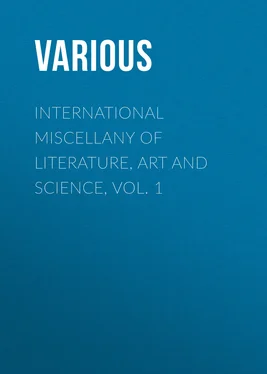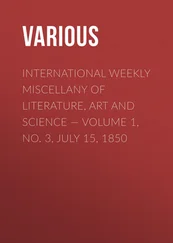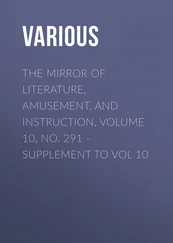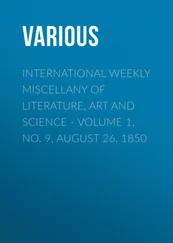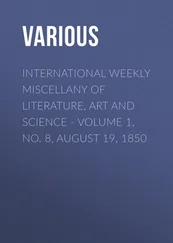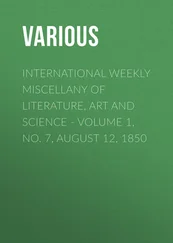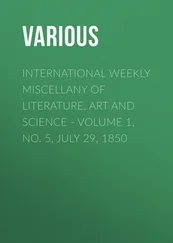Various - International Miscellany of Literature, Art and Science, Vol. 1
Здесь есть возможность читать онлайн «Various - International Miscellany of Literature, Art and Science, Vol. 1» — ознакомительный отрывок электронной книги совершенно бесплатно, а после прочтения отрывка купить полную версию. В некоторых случаях можно слушать аудио, скачать через торрент в формате fb2 и присутствует краткое содержание. Жанр: foreign_antique, periodic, foreign_edu, на английском языке. Описание произведения, (предисловие) а так же отзывы посетителей доступны на портале библиотеки ЛибКат.
- Название:International Miscellany of Literature, Art and Science, Vol. 1
- Автор:
- Жанр:
- Год:неизвестен
- ISBN:нет данных
- Рейтинг книги:3 / 5. Голосов: 1
-
Избранное:Добавить в избранное
- Отзывы:
-
Ваша оценка:
- 60
- 1
- 2
- 3
- 4
- 5
International Miscellany of Literature, Art and Science, Vol. 1: краткое содержание, описание и аннотация
Предлагаем к чтению аннотацию, описание, краткое содержание или предисловие (зависит от того, что написал сам автор книги «International Miscellany of Literature, Art and Science, Vol. 1»). Если вы не нашли необходимую информацию о книге — напишите в комментариях, мы постараемся отыскать её.
International Miscellany of Literature, Art and Science, Vol. 1 — читать онлайн ознакомительный отрывок
Ниже представлен текст книги, разбитый по страницам. Система сохранения места последней прочитанной страницы, позволяет с удобством читать онлайн бесплатно книгу «International Miscellany of Literature, Art and Science, Vol. 1», без необходимости каждый раз заново искать на чём Вы остановились. Поставьте закладку, и сможете в любой момент перейти на страницу, на которой закончили чтение.
Интервал:
Закладка:
–"Let me not permit any profundity of disgust to induce, even for an instant, a violation of the dignity of truth. What is not false , amid the scurrility of this man's statements, it is not in my nature to brand as false, although oozing from the filthy lips of which a lie is the only natural language. The errors and frailties which I deplore, it cannot at least be asserted that I have been the coward to deny. Never, even, have I made attempt at extenuating a weakness which is (or, by the blessing of God, was) a calamity, although those who did not know me intimately had little reason to regard it otherwise than a crime. For, indeed, had my pride, or that of my family permitted, there was much—very much—there was everything to be offered in extenuation. Perhaps, even, there was an epoch at which it might not have been wrong in me to hint—what by the testimony of Dr. Francis and other medical men I might have demonstrated, had the public, indeed, cared for the demonstration—that the irregularities so profoundly lamented were the effect of a terrible evil rather than its cause.—And now let me thank God that in redemption from the physical ill I have forever got rid of the moral."
Dr. Francis never gave any such testimony. On one occasion Poe borrowed fifty dollars from a distinguished literary woman of South Carolina, promising to return it in a few days, and when he failed to do so, and was asked for a written acknowledgment of the debt that might be exhibited to the husband of the friend who had thus served him, he denied all knowledge of it, and threatened to exhibit a correspondence which he said would make the woman infamous, if she said any more on the subject. Of course there had never been any such correspondence, but when Poe heard that a brother of the slandered party was in quest of him for the purpose of taking the satisfaction supposed to be due in such cases, he sent for Dr. Francis and induced him to carry to the gentleman his retraction and apology, with a statement which seemed true enough for the moment, that Poe was "out of his head." It is an ungracious duty to describe such conduct in a person of Poe's unquestionable genius and capacities of greatness, but those who are familiar with the career of this extraordinary creature can recall but too many similar anecdotes; and as to his intemperance, they perfectly well understand that its pathology was like that of ninety-nine of every hundred cases of the disease.
As the autumn of 1846 wore on, Poe's habits of frequent intoxication and his inattention to the means of support reduced him to much more than common destitution. He was now living at Fordham, several miles from the city, so that his necessities were not generally known even among his acquaintances; but when the dangerous illness of his wife was added to his misfortunes, and his dissipation and accumulated causes of anxiety had prostrated all his own energies, the subject was introduced into the journals. The Express said:
"We regret to learn that Edgar A. Poe and his wife are both dangerously ill with the consumption, and that the hand of misfortune lies heavy upon their temporal affairs. We are sorry to mention the fact that they are so far reduced as to be barely able to obtain the necessaries of life. This is indeed a hard lot, and we hope that the friends and admirers of Mr. Poe will come promptly to his assistance in his bitterest hour of need."
Mr. Willis, in an article in the Home Journal suggesting a hospital for disabled laborers with the brain, said—
"The feeling we have long entertained on this subject, has been freshened by a recent paragraph in the Express , announcing that Mr. Edgar A. Poe and his wife were both dangerously ill, and suffering for want of the common necessaries of life. Here is one of the finest scholars, one of the most original men of genius, and one of the most industrious of the literary profession of our country, whose temporary suspension of labor, from bodily illness, drops him immediately to a level with the common objects of public charity. There was no intermediate stopping-place-no respectful shelter where, with the delicacy due to genius and culture, he might secure aid, unadvertised, till, with returning health, he could resume his labors and his unmortified sense of independence. He must either apply to individual friends—(a resource to which death is sometimes almost preferable)—or suffer down to the level where Charity receives claimants, but where Rags and Humiliation are the only recognized Ushers to her presence. Is this right? Should there not be, in all highly civilized communities, an Institution designed expressly for educated and refined objects of charity—a hospital, a retreat, a home of seclusion and comfort, the sufficient claims to which would be such susceptibilities as are violated by the above mentioned appeal in a daily newspaper."
The entire article from which this paragraph is taken, was an ingenious apology for Mr. Poe's infirmities; but it was conceived and executed in a generous spirit, and it had a quick effect in various contributions, which relieved the poet from pecuniary embarrassments. The next week he published the following letter:
" My Dear Willis :—The paragraph which has been put in circulation respecting my wife's illness, my own, my poverty, etc., is now lying before me; together with the beautiful lines by Mrs. Locke and those by Mrs. –, to which the paragraph has given rise, as well as your kind and manly comments in The Home Journal . The motive of the paragraph I leave to the conscience of him or her who wrote it or suggested it. Since the thing is done, however, and since the concerns of my family are thus pitilessly thrust before the public, I perceive no mode of escape from a public statement of what is true and what erroneous in the report alluded to. That my wife is ill, then, is true; and you may imagine with what feelings I add that this illness, hopeless from the first, has been heightened and precipitated by her reception at two different periods, of anonymous letters,—one inclosing the paragraph now in question; the other, those published calumnies of Messrs. –, for which I yet hope to find redress in a court of justice.
"Of the facts, that I myself have been long and dangerously ill, and that my illness has been a well-understood thing among my brethren of the press, the best evidence is afforded by the innumerable paragraphs of personal and literary abuse with which I have been latterly assailed. This matter, however, will remedy itself. At the very first blush of my new prosperity, the gentlemen who toadied me in the old, will recollect themselves and toady me again. You, who know me, will comprehend that I speak of these things only as having served, in a measure, to lighten the gloom of unhappiness, by a gentle and not unpleasant sentiment of mingled pity, merriment and contempt. That, as the inevitable consequence of so long an illness, I have been in want of money, it would be folly in me to deny—but that I have ever materially suffered from privation, beyond the extent of my capacity for suffering, is not altogether true. That I am 'without friends' is a gross calumny, which I am sure you never could have believed, and which a thousand noble-hearted men would have good right never to forgive me for permitting to pass unnoticed and undenied. Even in the city of New York I could have no difficulty in naming a hundred persons, to each of whom—when the hour for speaking had arrived—I could and would have applied for aid with unbounded confidence, and with absolutely no sense of humiliation. I do not think, my dear Willis, that there is any need of my saying more. I am getting better, and may add—if it be any comfort to my enemies—that I have little fear of getting worse. The truth is, I have a great deal to do; and I have made up my mind not to die till it is done. Sincerely yours,
Читать дальшеИнтервал:
Закладка:
Похожие книги на «International Miscellany of Literature, Art and Science, Vol. 1»
Представляем Вашему вниманию похожие книги на «International Miscellany of Literature, Art and Science, Vol. 1» списком для выбора. Мы отобрали схожую по названию и смыслу литературу в надежде предоставить читателям больше вариантов отыскать новые, интересные, ещё непрочитанные произведения.
Обсуждение, отзывы о книге «International Miscellany of Literature, Art and Science, Vol. 1» и просто собственные мнения читателей. Оставьте ваши комментарии, напишите, что Вы думаете о произведении, его смысле или главных героях. Укажите что конкретно понравилось, а что нет, и почему Вы так считаете.
